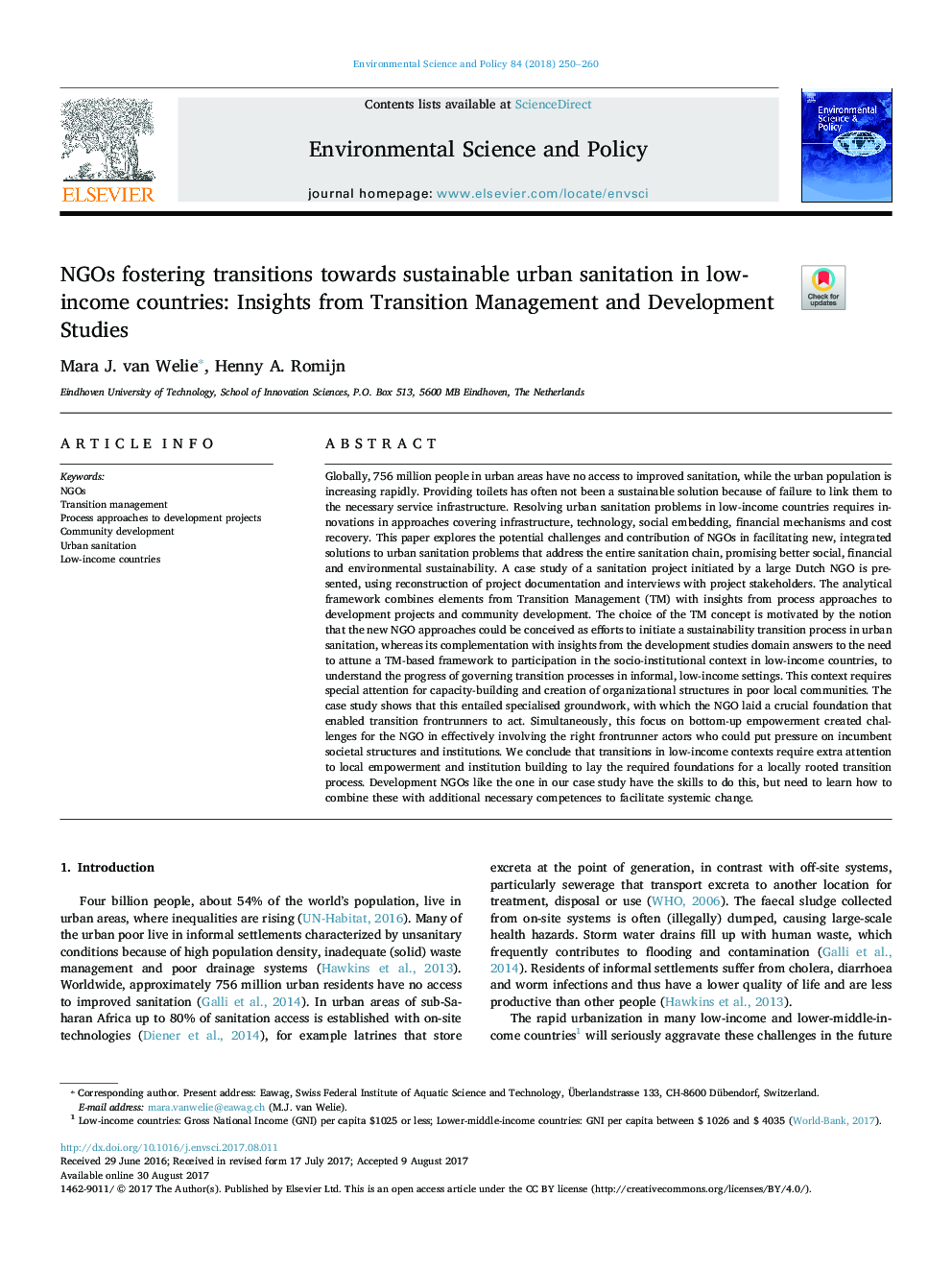| کد مقاله | کد نشریه | سال انتشار | مقاله انگلیسی | نسخه تمام متن |
|---|---|---|---|---|
| 7466008 | 1485024 | 2018 | 11 صفحه PDF | دانلود رایگان |
عنوان انگلیسی مقاله ISI
NGOs fostering transitions towards sustainable urban sanitation in low-income countries: Insights from Transition Management and Development Studies
ترجمه فارسی عنوان
سازمان های غیر دولتی که در زمینه های بهداشت و درمان پایدار شهری در کشورهای کم درآمد در حال رشد هستند: بینش های مدیریت گذار و مطالعات توسعه
دانلود مقاله + سفارش ترجمه
دانلود مقاله ISI انگلیسی
رایگان برای ایرانیان
کلمات کلیدی
سازمان های غیر دولتی، مدیریت گذار، رویکردهای فرآیند به پروژه های توسعه، توسعه جامعه، بهداشت شهری، کشورهای کم درآمد،
موضوعات مرتبط
مهندسی و علوم پایه
مهندسی انرژی
انرژی های تجدید پذیر، توسعه پایدار و محیط زیست
چکیده انگلیسی
Globally, 756 million people in urban areas have no access to improved sanitation, while the urban population is increasing rapidly. Providing toilets has often not been a sustainable solution because of failure to link them to the necessary service infrastructure. Resolving urban sanitation problems in low-income countries requires innovations in approaches covering infrastructure, technology, social embedding, financial mechanisms and cost recovery. This paper explores the potential challenges and contribution of NGOs in facilitating new, integrated solutions to urban sanitation problems that address the entire sanitation chain, promising better social, financial and environmental sustainability. A case study of a sanitation project initiated by a large Dutch NGO is presented, using reconstruction of project documentation and interviews with project stakeholders. The analytical framework combines elements from Transition Management (TM) with insights from process approaches to development projects and community development. The choice of the TM concept is motivated by the notion that the new NGO approaches could be conceived as efforts to initiate a sustainability transition process in urban sanitation, whereas its complementation with insights from the development studies domain answers to the need to attune a TM-based framework to participation in the socio-institutional context in low-income countries, to understand the progress of governing transition processes in informal, low-income settings. This context requires special attention for capacity-building and creation of organizational structures in poor local communities. The case study shows that this entailed specialised groundwork, with which the NGO laid a crucial foundation that enabled transition frontrunners to act. Simultaneously, this focus on bottom-up empowerment created challenges for the NGO in effectively involving the right frontrunner actors who could put pressure on incumbent societal structures and institutions. We conclude that transitions in low-income contexts require extra attention to local empowerment and institution building to lay the required foundations for a locally rooted transition process. Development NGOs like the one in our case study have the skills to do this, but need to learn how to combine these with additional necessary competences to facilitate systemic change.
ناشر
Database: Elsevier - ScienceDirect (ساینس دایرکت)
Journal: Environmental Science & Policy - Volume 84, June 2018, Pages 250-260
Journal: Environmental Science & Policy - Volume 84, June 2018, Pages 250-260
نویسندگان
Mara J. van Welie, Henny A. Romijn,
